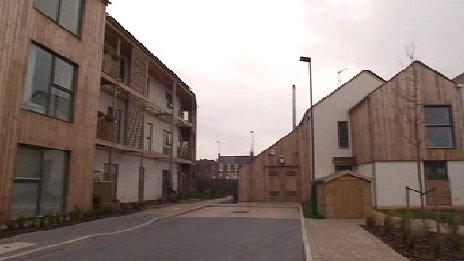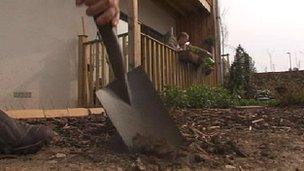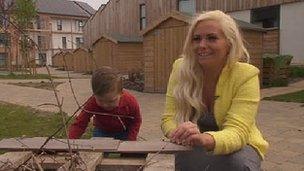Eco-friendly housing complex keeps down bills
- Published

Residents say it's their attitude - as much as science - that makes the project work
Residents living on the most eco-friendly social housing development in the UK are reporting massive reductions in energy bills.
Sinclair Meadows was launched six months ago and already, the average costs have been cut by seventy five per cent. Fiona Trott visited the complex in South Shields to find out how they do it.
One of the first things you notice at Sinclair Meadows is the smell.
It's a light woody smell coming from the timber clad homes which are facing the sun. The solar panels are also soaking it up and along with a boiler that runs on recycled wood pellets, these twenty one properties have all the energy they need.
Inside, the toilets use rainwater and there are vents which take in a room's heat and re-distribute it around the home.
But it's not just science which is apparently making this social scheme work, it's the attitude of the people who live here too. Their behaviour is even being monitored by Northumbria University. It's a living human experiment.
At one of the ground floor flats, Dot and Brian Wilson are out gardening. They're the couple on the complex with the green fingers and were chosen from five hundred applicants because of their environmental awareness.

The behaviour of residents is being monitored by a team from Northumbria University
"We've got some leeks, onions, cauliflower and we're going to get some peppers and peas too" Dot explains. I asked her what it feels like to be part of a grand experiment. She laughs with delight, "I've always wanted to live in an eco-friendly home and I never thought I'd be able to do it. But I can and I am!
"Everybody's got something different to offer. Those that can garden, do the gardening, and everybody else pitches in somewhere along the line".
Rio Adams is pitching in with the maintenance. She lives in one of the houses and is sweeping the paths (wood chippings are environmentally friendly but, apparently, they can cause a mess). Her two year old son Brody is over at the "bug hotel".
It's a damp timber structure with sticks, leaves and pipes to try and attract more insects. "The site used to be derelict" Rio explains. "There were no birds around and we're hoping that if there are more insects, it will encourage them back".
The sense of community is something that Northumbria University is keen to watch. Gill Davidson is one of the researchers, "We're trying to find out how this community grows.

Rio Adams says the "bug hotel" could attract birds back to the area
Some people started off being very environmentally aware and were living that kind of lifestyle already, whereas others weren't and we're finding that people are getting into the lifestyle much more now. There are gardening groups and a community group is also being set up."
Some people's good habits seem to be rubbing off on others. If not, there's a gadget which can help them along the way. Each kitchen has an energy monitor.
It shows how much electricity is being used and how much it costs. Early findings from this two-year experiment suggest that house bills at Sinclair Meadows are about £30 per month, compared to £30 per week in an average UK house.
Tenant Rachel MacMillan says fuel poverty hasn't been an issue for her even in the winter "My bills have halved since moving here in November, compared to what they were in my old house" She says. "As you can see, its 25C now, and I don't even have the heating on".
It costs between £77 and £115 per week to live here, but people who carry out repairs or run the boiler can get a reduction. The experiment itself is due to end in 2014 but residents say they plan to stay here for many years to come.